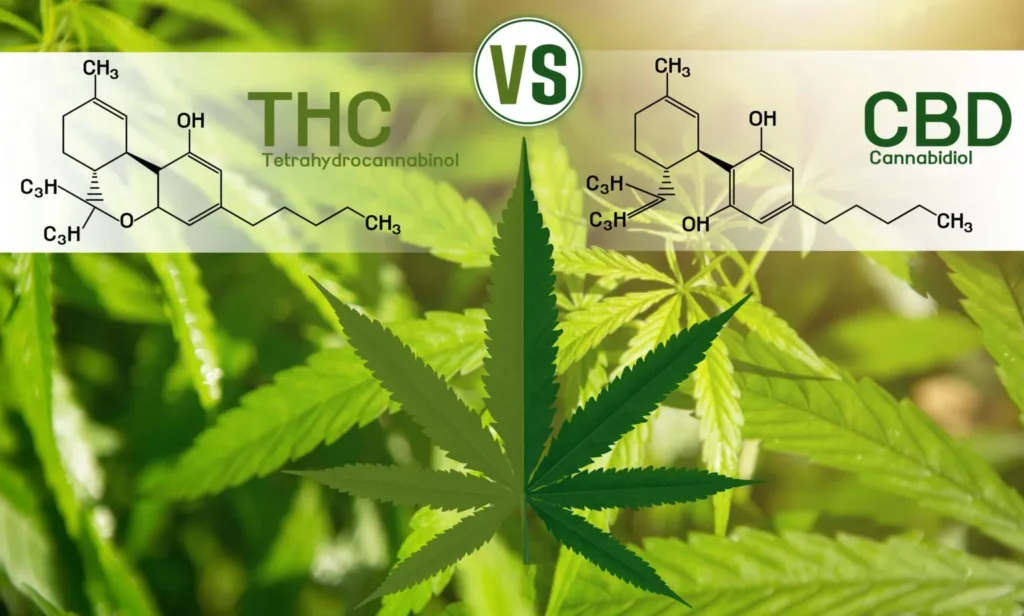Introduction
With the increasing legalization and use of marijuana and cannabidiol (CBD) products for humans, pet owners are curious about their potential effects on their animals, including rabbits. It’s essential to understand the significant differences between these two substances and how they interact with the unique physiology of rabbits. While CBD has shown promise in treating various conditions in pets, marijuana poses severe risks to rabbits.
Marijuana and Rabbits
Marijuana, containing the psychoactive compound tetrahydrocannabinol (THC), can be highly toxic to rabbits. THC affects the central nervous system, and rabbits, being small animals with a different metabolic process than humans, are particularly vulnerable to its effects.1,2
One case of accidental neurological poisoning and toxicity 1 has been published, as well as a set of research studies on small mammals, including rabbits.2
Reports of wild rabbits developing a taste for cannabis from the DEA 3 appear misguided at best. An article from The Street reports:4
“Unless rabbits have learned how to use fire – they aren’t going to be getting high. It’s simple chemistry! In the living plant, the cannabinoid THC is in its acid form – known as THCA. This compound isn’t psychoactive until it goes through a process called decarboxylation; this occurs with heat exposure. Since rabbits would eat the living plant – they wouldn’t be in any danger of experiencing euphoria or any result caused by the psychoactive nature of Delta-9-THC.”
Julianna Carella, the CEO of Auntie Dolores and Treat-ibles
CBD and Rabbits
CBD is a non-psychoactive component of cannabis that has gained popularity for its potential therapeutic effects. Unlike THC, CBD does not produce a “high” and is being studied for its benefits in treating pain, anxiety, and other conditions in pets. However, research specifically on rabbits is limited, and no signs of toxicity have been found.5,6
Potential Benefits
The potential benefits of CBD specifically for rabbits have not been researched. Claims regarding CBD in other small mammals, including cats and dogs include 7,8:
- Pain Relief: CBD may help manage chronic pain from conditions like arthritis.
- Anxiety Reduction: It could potentially reduce stress and anxiety, especially in high-stress environments.
- Anti-inflammatory Effects: CBD has anti-inflammatory properties that may benefit conditions involving inflammation.
Risks and Considerations
Despite potential benefits, several risks and considerations of using CBD with rabbits must be kept in mind:
- Lack of Research: There is limited research on CBD’s effects and safety in rabbits.
- Dosage Uncertainty: Appropriate dosing for rabbits is not well established, and incorrect dosages could lead to adverse effects.
- Quality and Purity: The quality of CBD products can vary widely. Contaminants or improper formulations could harm rabbits.
- Veterinary Guidance: Always consult with a veterinarian before giving CBD to rabbits to ensure it is safe and appropriate for their specific condition.
Several CBD vendors sell CBD specially formulated for pets, including rabbits, but do not have rabbit-specific data to back up their efficacy claims.
Conclusion
While CBD holds potential for therapeutic benefits in rabbits, caution is warranted due to the lack of extensive research and established dosing guidelines. Conversely, marijuana, specifically THC, is highly toxic to rabbits and should be avoided entirely. Rabbit caretakers should always consult with a rabbit-savvy veterinarian before introducing any new treatments or supplements to ensure their rabbits’ health and safety. As research progresses, a clearer understanding of the effects of CBD on rabbits will help guide safe and effective use.
Further Reading
Rabbit Savior: CBD for Rabbits
References
- Mumm, Lauren & Huckins, Gail & Lueck, Lizabeth & Piskorowski, Kayla & Sladky, Kurt. (2022). Cannabis toxicity in a pet rabbit (Oryctolagus cuniculus). Journal of Exotic Pet Medicine. 43. 10.1053/j.jepm.2022.06.004. ↩︎
- Fournier, E., Rosenberg, E., Hardy, N., Nahas, G. (1976). Teratologic Effects of Cannabis Extracts in Rabbits: A Preliminary Study. In: Nahas, G.G., Paton, W.D.M., Idänpään-Heikkilä, J.E. (eds) Marihuana. Springer, Berlin, Heidelberg. https://doi.org/10.1007/978-3-642-51624-5_37 ↩︎
- https://wapo.st/3UI0nAH ↩︎
- The Street. From Stoned Bunnies to Cannabis-Based Pet Care: What’s the Effect of Pot on Animals? ↩︎
- Tess A. Rooney DVM, MPH theresa.a.rooney@gmail.com, James W. Carpenter MS, DVM, DACZM, Butch KuKanich DVM, PhD, Sara M. Gardhouse DVM, DACZM, DABVP, Géraldine C. Magnin PhD, and Thomas N. Tully Jr. DVM, MS, DABVP, DECZM. Feeding decreases the oral bioavailability of cannabidiol and cannabidiolic acid in hemp oil in New Zealand White rabbits (Oryctolagus cuniculus). AVMA Publications. DOI:https://doi.org/10.2460/ajvr.22.01.0006 ↩︎
- Isaev, Dmytro et al. “Cannabidiol Inhibits Multiple Ion Channels in Rabbit Ventricular Cardiomyocytes.” Frontiers in pharmacology vol. 13 821758. 3 Feb. 2022, doi:10.3389/fphar.2022.821758 ↩︎
- Corsato Alvarenga I, Panickar KS, Hess H, McGrath S. Scientific Validation of Cannabidiol for Management of Dog and Cat Diseases. Annu Rev Anim Biosci. 2023 Feb 15;11:227-246. doi: 10.1146/annurev-animal-081122-070236. PMID: 36790884. ↩︎
- Cornell Veterinary School. CBD: What you need to know about its uses and efficacy. ↩︎

